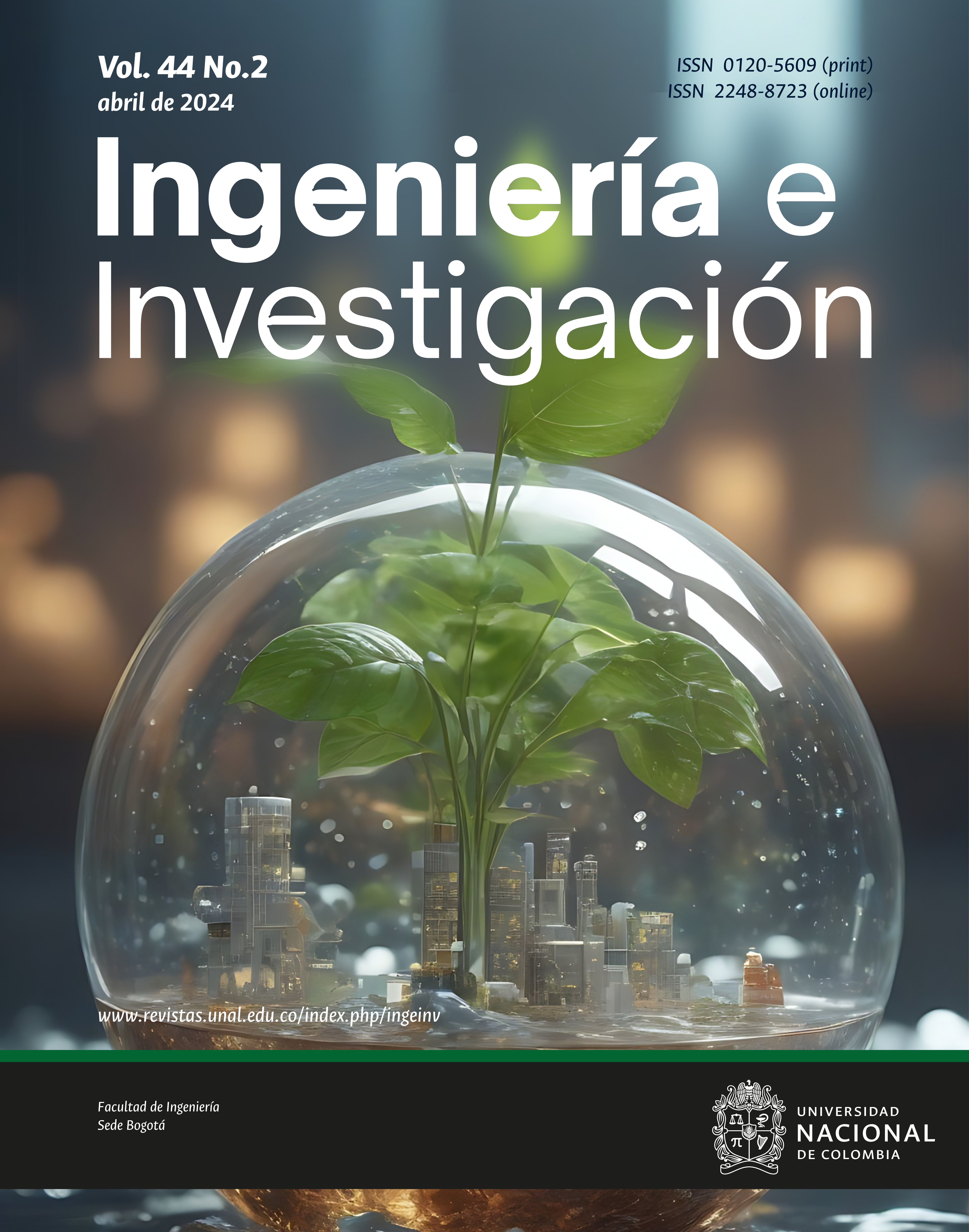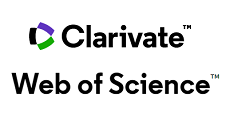Stress Evaluation Using Finite Elements in a Manual Agricultural Tool
Evaluación de esfuerzos mediante elementos finitos en una herramienta agrícola de acción manual
DOI:
https://doi.org/10.15446/ing.investig.104844Keywords:
handheld tools, elastic limits, fatigue, sustainable agriculture, ergonomics (en)herramientas manuales, límites elásticos, fatiga, agricultura sostenible, ergonomía (es)
Downloads
This study addresses the imperative need for efficient hand-held agricultural tools, particularly in challenging contexts like hillside agriculture, by focusing on the redesign and evaluation of a manual tillage tool. The objective is to comprehensively assess the stress and fatigue life of a redesigned tool, considering different manufacturing materials such as steels (AISI/SAE 4140, 4130, 1060), A356 aluminum, and nodular cast irons. Employing finite element method simulations and the Von Mises equation, this research confirms an optimal performance within elastic limits for all materials, mitigating the risks of plastic deformation or breakage during normal operation, with Von Mises stresses ranging from 8.39 to 16.30 MPa. All the tools yielded optimal results, meeting the critical requirements for soil penetration resistance, reporting no fatigue failures, and exhibiting useful life values over 1.75 x 1013 years. In terms of ergonomics, A356 aluminum stands out, as it is less heavy and implies a lower effort by the operator, promoting efficient tillage without compromising comfort. This research provides nuanced insights for the design of agricultural tools, emphasizing the harmonious balance between efficiency, longevity, and operator comfort in sustainable practices.
Este estudio aborda la imperiosa necesidad de herramientas agrícolas manuales que sean eficientes, especialmente en ámbitos desafiantes como la agricultura en laderas, centrándose en el rediseño y evaluación de una herramienta de labranza manual. El objetivo es evaluar exhaustivamente la tensión y la vida útil ante la fatiga de una herramienta rediseñada considerando diferentes materiales de fabricación como aceros (AISI/SAE 4140, 4130, 1060), aluminio A356 y hierros fundidos nodulares. Empleando simulaciones del método de elementos finitos y la ecuación de Von Mises, esta investigación confirma un rendimiento óptimo dentro de los límites elásticos para todos los materiales, mitigando los riesgos de deformación plástica o rotura durante la operación normal, con tensiones de Von Mises que van de 8.39 a 16.30 MPa. Todas las herramientas presentaron resultados óptimos, cumpliendo con los requisitos críticos de resistencia a la penetración del suelo, sin reportar fallas por fatiga y demostrando valores de vida útil superiores a 1.75 x 1013 años. En términos de ergonomía, el aluminio A356 se destaca por ser menos pesado e implicar un menor esfuerzo por parte del operador, promoviendo una labranza eficiente sin comprometer la comodidad. Esta investigación proporciona percepciones matizadas para el diseño de herramientas agrícolas, enfatizando el equilibrio armonioso entre eficiencia, longevidad y comodidad del operador en prácticas sostenibles.
References
Agudelo, P. (2013). Estudio de desgaste de recubrimientos duros en una herramienta de arado tipo cincel [Universidad Nacional de Colombia]. https://repositorio.unal.edu.co/handle/unal/20967
Ahmed, A., Wahab, M. S., Raus, A. A., Kamarudin, K., Bakhsh, Q., and Ali, D. (2016). Mechanical properties, material and design of the automobile piston: An ample review. Indian Journal of Science and Technology, 9(36). https://doi.org/10.17485/ijst/2016/v9i36/102155
Angus, H. T. (1976). Mechanical, physical and electrical properties of cast iron. In Cast Iron: Physical and Engineering Properties (2nd ed., pp. 34–160). Elsevier. https://doi.org/10.1016/B978-0-408-70933-0.50007-4
Ashburner, J. E., and Kienzle, J. (2013). Agricultural hand tools in emergencies: Guidelines for technical and field officers. FAO Plant Production and Protection Paper.
Balvanz, J., and Balvanz, R. (2019). Vertical tillage tool. U.S. Patent No. 10,314,221 B2. https://patents.google.com/patent/US10314221B2/en
Bednář, R., Votava, J., Červinka, J., and Fajman, M. (2013). Suitability of technical materials for machinery subsoilers for soil tillage. Acta Universitatis Agriculturae et Silviculturae Mendelianae Brunensis, 61(1), 9–16. https://doi.org/10.11118/actaun201361010009
Benos, L., Tsaopoulos, D., and Bochtis, D. (2020). A review on ergonomics in agriculture. part II: Mechanized operations. Applied Sciences (Switzerland), 10(10), 3484. https://doi.org/10.3390/app10103484
Botta, G. (2003). Guía de clases maquinaria agrícola, Licenciatura en Negocios Agropecuarios. Universidad de La Pampa, Facultad de Agronomía.
Budynas, R. G., and Nisbett, J. K. (2015). Diseño de ingeniería mecánica de Shigley (10th ed.). McGraw Hill.
Charco, J. L. (2017). Fabricación de un prototipo de block de motor de combustión interna de dos tiempos por manufactura aditiva indirecta con una aleación de aluminio al silicio [Undergraduate thesis, Escuela Politécnica
Nacional]. https://bibdigital.epn.edu.ec/handle/15000/18849
Cruz-Avilés, A., Ortiz-Domínguez, M., Suarez-López, Y., RiveraLanderos, E. A., Lechuga Canto, C. B., Muños-Sánchez, Y., Santana-Robles, F., and García-Pérez, C. (2018). Teoría de falla bajo carga estática. Ingenio y Conciencia Boletín
Científico de La Escuela Superior Ciudad Sahagún, 5(10), 3319. https://doi.org/10.29057/ess.v5i10.3319
De Almeida Luz, W. (2019). Desgaste em ferramentas de máquinas agrícolas: revisão bibliográfica [Thesis, Universidade Tecnológica Federal Do Paraná].
http://repositorio.roca.utfpr.edu.br/jspui/bitstream/1/14778/1/LD_COEME_2019_2_05.pdf
Dutt, A. (2015). Effect of mesh size on finite element analysis of beam. International Journal of Mechanical Engineering, 2(12), 8-10. https://doi.org/10.14445/23488360/IJME-V2I12P102
Enríquez Berciano, J. L., and Tremps Guerra, E. (2012). Fabricación de fundición nodular. Fundidores. https://oa.upm.es/14450/1/Fundición_nodular.pdf
Espejo, É., and Hernandez, H. (2017). Análisis de fallas de estructuras y elementos mecánicos (1st ed.). Universidad Nacional De Colombia.
Fernanda, T., Gatamorta, F., and Oliveira, M. (2018). A Influência das Condições Ambientais na Porosidade de rodas de ligas leves. https://doi.org/10.26678/ABCM.CONEM2018.CON18-1018
Gegel, G. A. (1998). Earthworking machine ground engaging tools having cast-in-place abrasion and impact resistant metal matrix composite components (Patent No. 5,743,033). Google Patents.
González Cobas, J. (2018). Lexicografía y sistematicidad. Acerca de los nombres que designan instrumentos agrícolas. Revista de Lexicografía, 22, 135-150. https://doi.org/10.17979/rlex.2016.22.0.3324
Herring, D. (2018). Heat treatment of cast irons. Industrial Heating. https://www.industrialheating.com/articles/94644-heat-treatment-of-cast-irons
Jaramillo, D. F. (2014). El suelo: origen, propiedades, espacialidad (2nd ed.). Universidad Nacional de Colombia, Sede Medellín.
Leslie, J. F. M., and Aguila, M. V. G. (2014). Análisis del comportamiento resistivo del implemento de trabajo del multiarado MAU-250. Acta Agronomica, 64(1), 22-29. https://doi.org/10.15446/acag.v64n1.42849
Malvajerdi, A. S. (2023). Wear and coating of tillage tools: A review. Heliyon, 9(6), e16669. https://doi.org/10.1016/j.heliyon.2023.e16669
Marcon, P. (2018). Agent of deterioration: Physical forces. Government of Canada. https://www.canada.ca/en/conservation-institute/services/agents-deterioration/physical-forces.html
Matweb (2016). Online Materials Information resource. http://www.matweb.com/
Mazoyer, M., and Roudart, L. (2006). A history of world agriculture. Earthscan. http://base.dnsgb.com.ua/files/book/Agriculture/History-of-Agriculture/A-History-of-World-Agriculture.pdf DOI: https://doi.org/10.4324/9781849773812
Molino, N., Bridson, R., and Fedkiw, R. (2003). Tetrahedral mesh generation for deformable bodies. https://graphics.stanford.edu/papers/meshing-sig03/meshing.pdf
Mott, R. L. (2009). Resistencia de materiales (Vol. 5). Pearson Educación.
Norton, R. (2011). Diseño de máquinas: un enfoque integrado (4th ed.). Pearson Educación.
O’Donell, H., and De Estrada, D. (2014). Presencia irlandesa en la milicia española. Revista Internacional de Historia Militar, 92, 555844. https://dialnet.unirioja.es/servlet/libro?codigo=555844
Pérez-González, A., Iserte-Vilar, J. L., and González-Lluch, C. (2011). Interpreting finite element results for brittle materials in endodontic restorations. BioMedical Engineering OnLine, 10(1), 44. https://doi.org/10.1186/1475-925X-10-44
Sanahuja, E. (1971). Instrumental de hierro agrícola e industrial de la época ibero-romana en cataluña. Pyrenae, 7, 61-110. https://core.ac.uk/download/pdf/39114287.pdf
Seeni, A., Rajendran, P., Hussin, M., and Ismail, F. (2020). Errors and uncertainties in simulation of steady, viscous flow past a circular cylinder at re = 20 using a systematic approach. INCAS Bulletin, 12(3), 203-217. https://doi.org/10.13111/2066-8201.2020.12.3.17
Sims, B. G., O’Neill, D. H., Walle, R. J., Ellis-Jones, J., Rivera Rosero, A., and Jirón Estrada, J. (1998). Ergonomic evaluation of hand-hoes for hillside weeding and soil preparation in Honduras. Ceiba, 39(2), 183-189.
Singh, J., Chatha, S. S., and Sidhu, B. S. (2020). Abrasive wear behavior of newly developed weld overlaid tillage tools in laboratory and in actual field conditions. Journal of Manufacturing Processes, 55, 143-152. https://doi.org/10.1016/j.jmapro.2020.03.040
SolidWorks (2022). Mesh quality checks. https://shorturl.at/qzEKO
Teko, D. R., Rouge, B., and Cormier, J. (2018). Base cutter blade (Patent No. US 2018/0139901 A1). https://patentimages.storage.googleapis.com/fc/a4/9d/21d94e1962fdee/US20180139901A1.pdf
Toni, S., Corrêa, C. C., de Souza, D. C., Muzeka, G., and Rossa, Ü. B. (2017). Enxada iracema, cavador tatuí e subsolador vangador de solo como novas ferramentas agrícolas como promotoras de tecnologias as propriedades rurais. Anais Da Mostra de Ensino, Pesquisa, Extensão e Cidadania (MEPEC), 2, 83-87.
https://publicacoes.ifc.edu.br/index.php/MEPEC/article/view/229
Vanegas Useche, L. V. (2018). Diseño de elementos de máquinas. Universidad Tecnológica de Pereira. https://doi.org/10.22517/9789587223019
Yazici, A. (2011). Wear behavior of carbonitride-treated ploughshares produced from 30MnB5 steel for soil tillage applications. Metal Science and Heat Treatment, 53, 46-51. DOI: https://doi.org/10.1007/s11041-011-9377-z
Yu, H.-J., and Bhole, S. D. (1990). Development of a prototype abrasive wear tester for tillage tool materials. Tribology International, 23(5), 309-316. https://doi.org/10.1016/0301-679X(90)90004-9
Yusuf, H., and Yusuf, D. (2006). Ergonomics of selected hand tools for soil tillage in Nigeria [Conference paper]. International Conference on Engineering Research & Development: Impact on Industry. https://www.researchgate.net/publication/365762299%0AErgonomics
How to Cite
APA
ACM
ACS
ABNT
Chicago
Harvard
IEEE
MLA
Turabian
Vancouver
Download Citation
CrossRef Cited-by
1. Juan Martin Montoya Fernández, Germán Leonardo García Monsalve, Mauricio Arango Correa, Santiago Parada Duque. (2025). Computer-aided engineering: an innovative methodology for the design of agricultural tools for family farming. REVISTA COLOMBIANA DE TECNOLOGIAS DE AVANZADA (RCTA), 1(45), p.125. https://doi.org/10.24054/rcta.v1i45.3237.
Dimensions
PlumX
Article abstract page views
Downloads
License
Copyright (c) 2024 Laura Delgado-Bejarano, Hugo González-Sánchez, Germán García-Monsalve

This work is licensed under a Creative Commons Attribution 4.0 International License.
The authors or holders of the copyright for each article hereby confer exclusive, limited and free authorization on the Universidad Nacional de Colombia's journal Ingeniería e Investigación concerning the aforementioned article which, once it has been evaluated and approved, will be submitted for publication, in line with the following items:
1. The version which has been corrected according to the evaluators' suggestions will be remitted and it will be made clear whether the aforementioned article is an unedited document regarding which the rights to be authorized are held and total responsibility will be assumed by the authors for the content of the work being submitted to Ingeniería e Investigación, the Universidad Nacional de Colombia and third-parties;
2. The authorization conferred on the journal will come into force from the date on which it is included in the respective volume and issue of Ingeniería e Investigación in the Open Journal Systems and on the journal's main page (https://revistas.unal.edu.co/index.php/ingeinv), as well as in different databases and indices in which the publication is indexed;
3. The authors authorize the Universidad Nacional de Colombia's journal Ingeniería e Investigación to publish the document in whatever required format (printed, digital, electronic or whatsoever known or yet to be discovered form) and authorize Ingeniería e Investigación to include the work in any indices and/or search engines deemed necessary for promoting its diffusion;
4. The authors accept that such authorization is given free of charge and they, therefore, waive any right to receive remuneration from the publication, distribution, public communication and any use whatsoever referred to in the terms of this authorization.



























